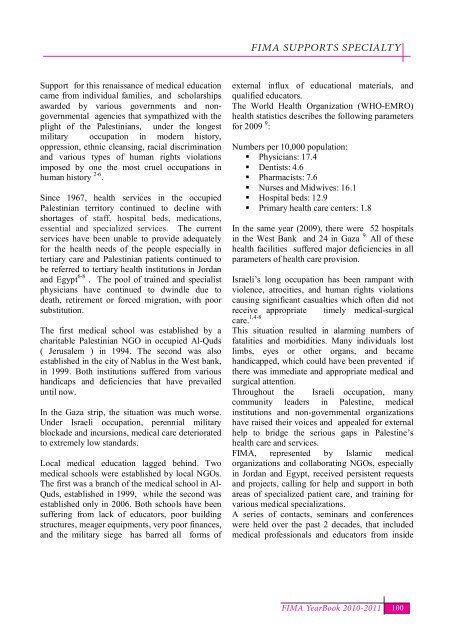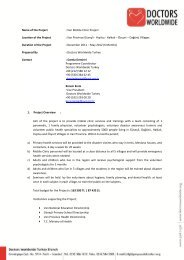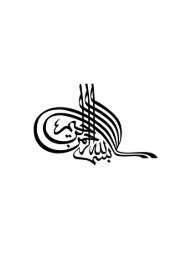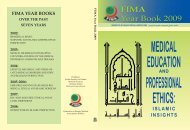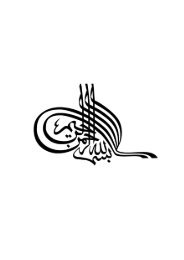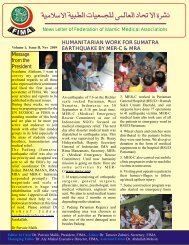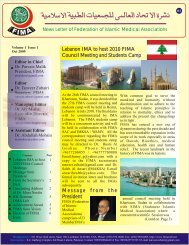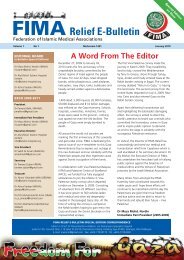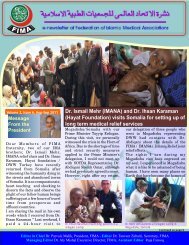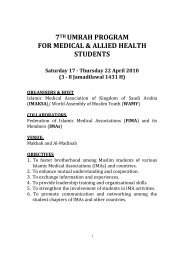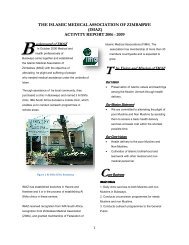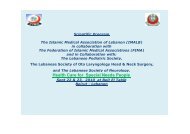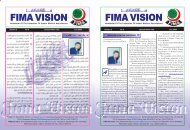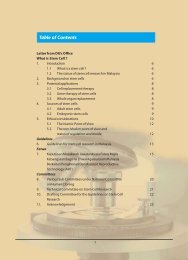FIMA Year Book 2010-2011 - Federation of Islamic Medical ...
FIMA Year Book 2010-2011 - Federation of Islamic Medical ...
FIMA Year Book 2010-2011 - Federation of Islamic Medical ...
You also want an ePaper? Increase the reach of your titles
YUMPU automatically turns print PDFs into web optimized ePapers that Google loves.
<strong>FIMA</strong> SUPPORTS SPECIALTY<br />
Support for this renaissance <strong>of</strong> medical education<br />
came from individual families, and scholarships<br />
awarded by various governments and nongovernmental<br />
agencies that sympathized with the<br />
plight <strong>of</strong> the Palestinians, under the longest<br />
military occupation in modern history,<br />
oppression, ethnic cleansing, racial discrimination<br />
and various types <strong>of</strong> human rights violations<br />
imposed by one the most cruel occupations in<br />
human history 2-6 .<br />
Since 1967, health services in the occupied<br />
Palestinian territory continued to decline with<br />
shortages <strong>of</strong> staff, hospital beds, medications,<br />
essential and specialized services. The current<br />
services have been unable to provide adequately<br />
for the health needs <strong>of</strong> the people especially in<br />
tertiary care and Palestinian patients continued to<br />
be referred to tertiary health institutions in Jordan<br />
and Egypt 6-8 . The pool <strong>of</strong> trained and specialist<br />
physicians have continued to dwindle due to<br />
death, retirement or forced migration, with poor<br />
substitution.<br />
The first medical school was established by a<br />
charitable Palestinian NGO in occupied Al-Quds<br />
( Jerusalem ) in 1994. The second was also<br />
established in the city <strong>of</strong> Nablus in the West bank,<br />
in 1999. Both institutions suffered from various<br />
handicaps and deficiencies that have prevailed<br />
until now.<br />
In the Gaza strip, the situation was much worse.<br />
Under Israeli occupation, perennial military<br />
blockade and incursions, medical care deteriorated<br />
to extremely low standards.<br />
Local medical education lagged behind. Two<br />
medical schools were established by local NGOs.<br />
The first was a branch <strong>of</strong> the medical school in Al-<br />
Quds, established in 1999, while the second was<br />
established only in 2006. Both schools have been<br />
suffering from lack <strong>of</strong> educators, poor building<br />
structures, meager equipments, very poor finances,<br />
and the military siege has barred all forms <strong>of</strong><br />
external influx <strong>of</strong> educational materials, and<br />
qualified educators.<br />
The World Health Organization (WHO-EMRO)<br />
health statistics describes the following parameters<br />
for 2009 9 :<br />
Numbers per 10,000 population:<br />
• Physicians: 17.4<br />
• Dentists: 4.6<br />
• Pharmacists: 7.6<br />
• Nurses and Midwives: 16.1<br />
• Hospital beds: 12.9<br />
• Primary health care centers: 1.8<br />
In the same year (2009), there were 52 hospitals<br />
in the West Bank and 24 in Gaza 9. All <strong>of</strong> these<br />
health facilities suffered major deficiencies in all<br />
parameters <strong>of</strong> health care provision.<br />
Israeli’s long occupation has been rampant with<br />
violence, atrocities, and human rights violations<br />
causing significant casualties which <strong>of</strong>ten did not<br />
receive appropriate timely medical-surgical<br />
care. 1,4-8<br />
This situation resulted in alarming numbers <strong>of</strong><br />
fatalities and morbidities. Many individuals lost<br />
limbs, eyes or other organs, and became<br />
handicapped, which could have been prevented if<br />
there was immediate and appropriate medical and<br />
surgical attention.<br />
Throughout the Israeli occupation, many<br />
community leaders in Palestine, medical<br />
institutions and non-governmental organizations<br />
have raised their voices and appealed for external<br />
help to bridge the serious gaps in Palestine’s<br />
health care and services.<br />
<strong>FIMA</strong>, represented by <strong>Islamic</strong> medical<br />
organizations and collaborating NGOs, especially<br />
in Jordan and Egypt, received persistent requests<br />
and projects, calling for help and support in both<br />
areas <strong>of</strong> specialized patient care, and training for<br />
various medical specializations.<br />
A series <strong>of</strong> contacts, seminars and conferences<br />
were held over the past 2 decades, that included<br />
medical pr<strong>of</strong>essionals and educators from inside<br />
<strong>FIMA</strong> <strong>Year</strong><strong>Book</strong> <strong>2010</strong>-<strong>2011</strong> 100


